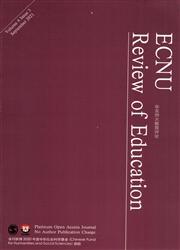什么知识最有价值?当代德智之争中的新儒家思考
IF 2.6
Q1 EDUCATION & EDUCATIONAL RESEARCH
引用次数: 1
摘要
亮点关于各种形式的知识的相对有用性的长期争论,特别是在理论和实践以及知识和道德之间的争论,是西方和中国过去和现在教育的核心(de Bary,1988200420052015)。新儒家在21世纪仍然具有相关性,可以帮助我们理解和阐明当代教育辩论——特别是,正如斯宾塞在近一个半世纪前所问的那样,回答“什么知识最有价值?”。孟子、朱neneneba习、王阳明、徐艾和康有为主张一种能与杜威(1938)和弗雷尔(19701978)产生强烈共鸣的学术。教育的基本哲学,特别是在美国,在很大程度上借鉴了20世纪欧美思想家;本文试图纠正这种短视,拓宽视野。本文章由计算机程序翻译,如有差异,请以英文原文为准。
What Knowledge is of Most Worth? Considering the Neo-Confucians in the Contemporary Debate Between Moral and Intellectual Learning
Highlights The perennial debate regarding the relative usefulness of various forms of knowledge, especially between the theoretical and practical and the intellectual and moral, lies at the heart of education in both past and present times in both the West and China (de Bary, 1988, 2004, 2005, 2015). Neo-Confucians remain relevant in the 21st century and can help us to understand and elucidate contemporary debates in education—specifically, to answer, as Spencer asked nearly a century and a half ago, “What knowledge is of most worth?”. Mencius, Zhu Xi, Wang Yangming, Xu Ai, and Kang Youwei advocated for a type of learning that would strongly resonate with John Dewey (1938) and Paulo Freire (1970, 1978). Foundational philosophies of education, particularly in the United States, have drawn heavily on 20th century European—American thinkers; this article attempts to correct this myopia and broaden perspectives.
求助全文
通过发布文献求助,成功后即可免费获取论文全文。
去求助
来源期刊

ECNU Review of Education
Social Sciences-Education
CiteScore
4.90
自引率
0.00%
发文量
41
审稿时长
10 weeks
 求助内容:
求助内容: 应助结果提醒方式:
应助结果提醒方式:


